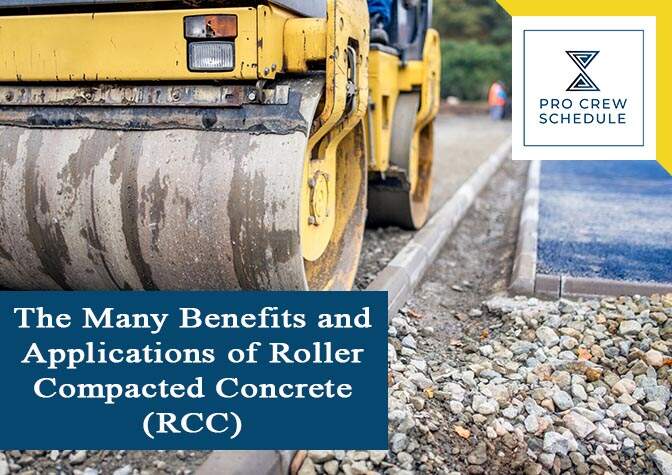Road builders and paving contractors are turning to Roller Compacted Concrete (RCC) as their pavement of choice in larger numbers. It is because the acceptance of RCC grows across the U.S. Roller Compacted Concrete offers unique qualities completely different from asphalt or traditional concrete that transformed the pavement as a fast-construction and economical candidate for several applications previously reserved for conventional concrete.
Today, many contractors and builders are becoming increasingly aware of how Roller Compacted Concrete is placed with high-density asphalt pavers compare to asphalt alternatives. Read on to discover why you need to consider RCC for your next projects.
What is Roller Compacted Concrete?
RCC or Roller-compacted concrete, which derives its name from the construction method used to build it typically, is concrete of zero-slump stability in its unhardened state. It’s commonly defined as concrete compacted by a roller. It would ensure a very effective consolidation vital for achieving satisfactory density, smoothness, compressive strength, and surface texture. This RCC is generally constructed without formwork, finishing, joints, steel reinforcement, or dowels.
These unique characteristics make roller-compacted concrete faster, economical and straightforward. RCC owes much of its economy to high-speed, high-volume construction methods. In fact, nowadays, Roller Compacted Concrete is being used whenever durability, economy, and strength are primary needs.
RCC is now being applied to rehabilitate and construct dams, airfields, parking lots, power plants, roads, storage facilities, and other industrial developments. Depending on the preferred width and thickness of the installation, the concrete could be laid very quickly, from sixty to one hundred meters per hour.
Benefits of Roller Compacted Concrete
1. Speed of Construction
One of the biggest benefits of RCC pavement is it can be constructed more cost-effectively and quickly than traditional concrete or any other asphalt pavements. Roller compacted concrete is being placed with high-density and asphalt-type paving equipment smoothly compacted with rollers, diminishing the needs of finishing and forming.
In most cases, RCC can compete in just one pass. And extremely heavy-duty pavements requiring thickness greater than ten inches may require two lifts. And because of its compaction and density, RCC achieves adequate load carrying capacity and has, in many cases, been open to within twenty-four hours right after placement.
2. Sustainability
RCC pavements are environmentally friendly. Supplementary cementitious materials in construction such as ground granulated blast –furnace slag and fly ash can be used, minimizing the amount of Portland cement and, therefore, lowering the embodied energy of RCC mix. In addition, the RCC’s lighter color can provide a much greater light reflectivity, which only means safer and brighter surroundings and lower lighting requirements.
As a matter of fact, RCC pavement reduces energy consumption by as much as thirty-seven percent by either allowing lower wattage light or minimizing the number of light fixtures needed. The light color of RCC also means heat is being absorbed, causing cooler communities.
3. Low Maintenance
Similar to traditional concrete, RR has only fewer necessary repairs over its service life. There’s no resurfacing or seal coating required. And aside from random cleaning using a vacuum or sweeper, the maintenance requirements for Roller Compacted Concrete are minimal.
4. Durability
Roller compacted concrete is a very rigid pavement that can easily withstand and endure load from traffic. Since it can carry heavy loads, RCC will not rut from any heavy axle loads, nor it shoves or tear from braking and turning vehicles. Moreover, RCC has all of the durability of traditional concrete pavement, including the ability to endure the extremes of winter cold and summer heat and resistance to oils, solvents, fuels, and other fluids.
A properly designed RCC pavement can easily provide more than 20 years of service.
5. Competitive Cost
There are many cost savings associated with RCC. Historically, RCC has been comparable in cost compare to asphalt pavement. With the rising asphalt and oil costs, RCC can potentially be lower in terms of initial paving costs. When being compared to traditional concrete paving costs, RCC can now provide savings of twenty to thirty percent. And owners can more than appreciate the lower life-cycle costs associated with RCC’s low maintenance requirements.
6. Safety
Light-colored RCC surfaces are much easier to see during the night compare to the blacktop. And most importantly, they retain surface integrity. In comparison, heavy vehicles might leave rust on asphalt roads that can become more hazardous in snowy/icy conditions.
Having RCC reduced recurring repairs and resurfacing, causing increase safety to your work zone set-ups. Safety is one thing that has to be prioritized when working on road constructions. You can better manage all safety considerations using subcontractor scheduling software. This specialized software tool ensures that all of the essential safety resources are carried out, reducing possible accidents at work.
Other Advantages of Roller Compacted Concrete
While it’s already been stated that RCC’s main advantages are faster construction and reduced costs, there are other unique advantages of it as well:
- Minimal maintenance required
- Resistance to pushing and shoving
- No potholes and no rutting
- Resistance to oil spills, hydraulic acids, or fuels
- Rebar is not required
- Formwork costs are reduced or eliminated due to layer placement method
- High volume placement
- Rebar is not required
- Span soft localized subgrades
- It doesn’t deform under concentrated, heavy loads
- Can withstand high temperatures
- No concerns about high heat release while the concrete is drying
- Reduce cement consumption while the leaner concrete mix can be used.
- Small construction crew is all you need. However, make sure construction crew management should be carried out.
- The expenses for placement, transporting, and compaction of concrete are lessened because concrete can be towed by dump trucks, spread evenly by bulldozers and compacted by vibratory rollers.
Several Applications of RCC
In general, Roller Compacted Concrete can be used at your site since there’s an increase in demand for RCC recently in both public and private construction projects. Although RCC has been widely used almost and exclusively in the rehabilitation of existing dams and new dam constructions, it can also be used for the following applications:
1. RCC for streets and highways
Roller-compact concrete is a mix of dense-graded aggregates, water, and Portland cement. This zero deceleration concrete mixture, once placed with an asphalt paver and then compacted to excessive density, provides high power and strong pavement structure for streets and highways.
Roller compacted concrete makes use of no forms, requires no traditional finishing, no reinforcing steel with no economical options. As a result, the RCC typically offers superior efficiency under heavy wheel loads, difficult working conditions, and excessive climates.
2. Composting Areas, Logging Facilities and Storage Yards
The application requires durability and strength to help heavy loads. Texture, smoothness, and surface look are of little importance for these functions because course aggregates can be used. Dozers and road rollers are usually used to position roller-compacted concrete in the most primary functions.
3. Ports, Heavy Industrial Facilities and Intermediate facilities
Heavy facilities are larger, open areas with a few boundaries that may delay the development process, making them very best for RCC. And also, heavy containers often carry loads of 14 tons which makes RCC an excellent option to use. While it’s proven that RCC is a perfect option for heavy industrial or intermediate facilities, ensure to make a lot of observation.
Observing and tracking is made easier for project leaders like you with mobile construction scheduling software. It has been a well-known fact that today’s latest industry technologies are designed to make things easier for construction professionals.
Wonder how it will help your business and projects? Request a live demo and get a 30-day FREE trial!
4. Light Industrial Areas
Similar to heavy industrial, light industrial areas are similar to auto manufacturing facilities and warehouse facilities that provide massive uninterrupted areas that are perfect for concrete. So access roads throughout the industrial complex need another utility for roller-compacted concrete.
5. Aerial Streets
Well, you already know that traffic is always the primary concern when paving major paths. And due to the time required to place multiple asphalt lifts and traffic barriers, some of your works can be selected to utilize a single lift of RCC pavement in order to pave the major streets.
In managing tasks related to these construction activities, make use of project scheduling tools. A reliable and multi-functional project tool can make scheduling and tracking your tasks very easy and efficient.
6. Local Streets
Economy, construction speed, and early opening for traffic are crucial factors for using for local roads. In many cases, light traffic is being placed on RCC pavement within twenty-four hours right after construction. Additionally, you can use roller compact concrete for new commercial developments to have a stronger working platform during construction and site work.
Moreover, always keep track of the project’s progress. You can best track and monitor construction projects using construction scheduling software. Advanced software like this enables you to have complete control in every aspect of your business, especially your team.
Key Takeaways
There are many benefits when using RCC, but the primary factor is that RCC can be constructed much faster and cheaper than conventional concrete and multiple lift asphalt pavements. Above all, the cost savings often associated with RCC is credited not only to the ease of construction but also this material uses lesser Portland cement – the most expensive ingredient in conventional concrete.







